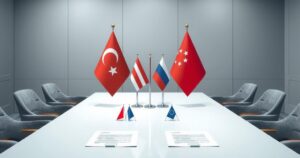Strengthening Ties: Nayib Bukele’s Official Visit to Argentina

The visit of El Salvador’s President Nayib Bukele to Argentina concluded with agreements to enhance cooperation in security, energy, and cultural exchange, marked by the signing of a joint declaration with Argentine President Javier Milei. The meeting emphasized shared anti-corruption sentiments and critical discussions about Bitcoin regulation in El Salvador, alongside significant security policy discussions reflecting both nations’ approaches to governance.
The visit of El Salvador’s President Nayib Bukele to Argentina has concluded, marking a significant opportunity to enhance bilateral relations with Argentine President Javier Milei. This inaugural official visit involved constructive discussions centered around collaboration in critical sectors, including security, energy, and the economy. The two presidents convened at the Casa Rosada, where they participated in a bilateral meeting that resulted in signing a joint declaration and several agreements concerning cultural exchange, air transport, nuclear energy, sports, and the preservation of cultural heritage. Following this, Bukele engaged with Argentina’s Foreign Minister Diana Mondino to launch a high-level business forum featuring representatives from key industries such as technology, manufacturing, and food and beverages. In their discussions, both leaders expressed a unified stance against perceived corruption, criticizing human rights organizations for allegedly distorting their missions. This sentiment echoed their remarks at the recent United Nations General Assembly, where they criticized UN initiatives for promoting a “socialist agenda” and operating in an increasingly unfree world. Bukele’s stringent security policies, which include the establishment of a large maximum-security prison, resonated with Milei’s administration, aiming to combat drug trafficking and restore public safety. Minister Patricia Bullrich of Argentina reaffirmed their commitment to this model, stating, “We are going to the bottom of the fight against drug trafficking.” During his visit, Bukele received notable honors from Milei, becoming the first foreign head of state welcomed with a formal state ceremony. Discussions also covered the implications of Bitcoin adoption in El Salvador, as Bukele and Argentine senate members explored the framework for cryptocurrency regulation. Bukele elaborated on his country’s significant progress in reducing crime rates, asserting that El Salvador has transitioned from being one of the world’s most dangerous nations to a more secure environment. Significant agreements were established, focusing on cultural cooperation, the creation of an air transport hub, and collaboration in the nuclear energy sector. Additional arrangements included joint efforts in sports, irrigation management, and a cooperative understanding between Argentina’s National Library and El Salvador’s Ministry of Culture. These agreements reflect a robust commitment to fostering closer ties between the two nations across various domains.
The discussions and agreements between Presidents Nayib Bukele and Javier Milei highlight their intent to build a strategic partnership that leverages both countries’ strengths in various sectors. Bukele’s administration has garnered attention for its controversial yet impactful security policies and cryptocurrency initiatives, particularly regarding Bitcoin, which influence the economic landscape of El Salvador. Concurrently, Milei’s government emerges with a strong focus on transparency and anti-corruption efforts, aligning with Bukele’s governance approach. Their common ground on international criticism further positions both leaders as likeminded allies on the global stage, particularly in matters concerning security and human rights perspectives.
In conclusion, President Nayib Bukele’s visit to Argentina underscores a significant strengthening of bilateral relations between El Salvador and Argentina. The collaboration addresses vital areas such as security, economic development, and cultural exchange. Both presidents’ shared ideologies and critiques of international organizations showcase their commitment to reshaping their nations’ narratives and policies. The agreements forged during this visit are poised to enhance cooperation, attract investment, and potentially influence broader international relations within their respective regions.
Original Source: www.agenzianova.com





